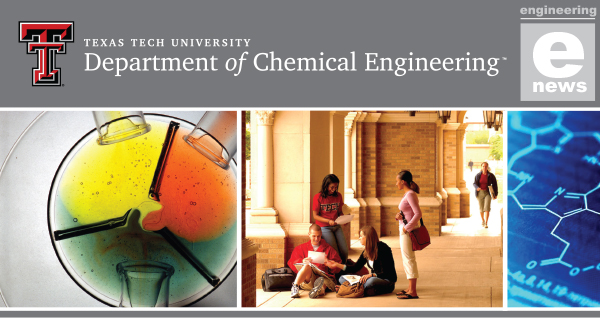
Student News
 The class of 2018, with 85 students, was our largest graduating class to date. More
importantly, they were a great class with a good work ethic, a dedication to excellence,
and good grit. Special recognition to Hattie Schunk, the commencement flag bearer
for the Whitacre College of Engineering, and our thirty (30!!!) students who graduated
with honors! We anticipate an exceptional future for all! Good luck and guns up!
The class of 2018, with 85 students, was our largest graduating class to date. More
importantly, they were a great class with a good work ethic, a dedication to excellence,
and good grit. Special recognition to Hattie Schunk, the commencement flag bearer
for the Whitacre College of Engineering, and our thirty (30!!!) students who graduated
with honors! We anticipate an exceptional future for all! Good luck and guns up!
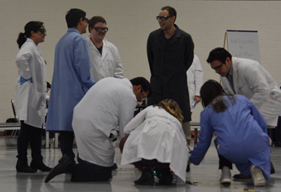 The Texas Tech ChemE Car Team swept Regionals, last March at Corpus Christi, winning
first place in all categories - poster, safety, and performance!!! The team was led
by Josh Holtz and team members include Ethan Thomas, Blake Hanford, Cassie Alvarez,
Tyler Chiraboga, and Chris Garza. The TTU car is unique in that it is powered by thermoelectric
generators employing the Seebeck effect. With their first place finish at Regionals,
the team earned a berth to compete at Nationals where they hope to place in the performance
competition. The Car Team is advised by Dr. Jeremy Marston.
The Texas Tech ChemE Car Team swept Regionals, last March at Corpus Christi, winning
first place in all categories - poster, safety, and performance!!! The team was led
by Josh Holtz and team members include Ethan Thomas, Blake Hanford, Cassie Alvarez,
Tyler Chiraboga, and Chris Garza. The TTU car is unique in that it is powered by thermoelectric
generators employing the Seebeck effect. With their first place finish at Regionals,
the team earned a berth to compete at Nationals where they hope to place in the performance
competition. The Car Team is advised by Dr. Jeremy Marston.
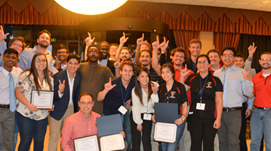 Great performances at Regionals were also made by a host of other Chemical Engineering
students, including the ChE Jeopardy Team, which took second. The team, which included
Charles Alvin Elliott, Nicolas Rodriguez, Matthew Parker, and Katlyn Porter, defeated
Texas A&M by a margin of 11899 to 0 in the first round, but they lost in the finals
to The University of Texas at Austin. Also from Texas Tech, Caleb D. Wright took third
place in the research poster competition, and Texas Tech's second car, led by Alexandra
Bramlet, received third place in the poster competition.
Great performances at Regionals were also made by a host of other Chemical Engineering
students, including the ChE Jeopardy Team, which took second. The team, which included
Charles Alvin Elliott, Nicolas Rodriguez, Matthew Parker, and Katlyn Porter, defeated
Texas A&M by a margin of 11899 to 0 in the first round, but they lost in the finals
to The University of Texas at Austin. Also from Texas Tech, Caleb D. Wright took third
place in the research poster competition, and Texas Tech's second car, led by Alexandra
Bramlet, received third place in the poster competition.
Nearly half of our undergraduates perform research during their undergraduate career. Not only does this undergraduate research develop their laboratory and critical thinking skills, it also opens new opportunities, and some of these students become so inspired that they go on to graduate school and become faculty members. Enjoy the following brief stories of eight of our students who performed research this past summer, some at Texas Tech and others around the world.
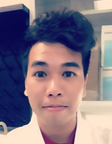 Senior Khoa Do performed research this past summer at the Illinois Institute of Technology
(IIT) in Chicago as part of IIT's Interdisciplinary Reseach Experience for Undergraduates
(REU) in Food Safety, Food Engineering, and Nutrition. Khoa designed an energy-efficient
high pressure thermal sterilization process for foods and wrote a MatLab code to model
the deactivation of foodborne pathogens depending on the food geometry. The high pressure
process is useful because pathogens can be killed without overheating the food, thereby
not changing its texture. The REU program was eye-opening to Khoa who really enjoyed
learning about food safety and food science.
Senior Khoa Do performed research this past summer at the Illinois Institute of Technology
(IIT) in Chicago as part of IIT's Interdisciplinary Reseach Experience for Undergraduates
(REU) in Food Safety, Food Engineering, and Nutrition. Khoa designed an energy-efficient
high pressure thermal sterilization process for foods and wrote a MatLab code to model
the deactivation of foodborne pathogens depending on the food geometry. The high pressure
process is useful because pathogens can be killed without overheating the food, thereby
not changing its texture. The REU program was eye-opening to Khoa who really enjoyed
learning about food safety and food science.
 This summer, junior Elizabeth M. Gomez participated in an REU program at Washington
State University which focused on Engineering Tools for Disease Diagnosis and Treatment.
Her project involved using electrophoretic techniques to separate disease specific
biomarkers from exosome samples, such as blood or saliva, for non-invasive disease
diagnosis. Elizabeth's work concentrated on cancer, and she showed that the new technique
was viable through both computer simulations and experiments. Elizabeth plans to continue
research and get her PhD after graduation.
This summer, junior Elizabeth M. Gomez participated in an REU program at Washington
State University which focused on Engineering Tools for Disease Diagnosis and Treatment.
Her project involved using electrophoretic techniques to separate disease specific
biomarkers from exosome samples, such as blood or saliva, for non-invasive disease
diagnosis. Elizabeth's work concentrated on cancer, and she showed that the new technique
was viable through both computer simulations and experiments. Elizabeth plans to continue
research and get her PhD after graduation.
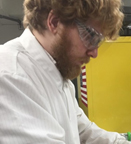 Senior Joseph Griesel spent the summer conducting research in a microfluidics laboratory
at the New Jersey Institute of Technology as part of their REU program. Joseph's research
focused on developing a low-cost green synthesis of silver nanoparticles using lab-on-a-chip
devices. During his time at NJIT, Joseph also helped with the outreach event "Dinner
with an Engineer," part of the ExxonMobil Bernard Harris Summer Science Camp and aimed
at sparking the interest of pre-high school students in science and engineering. After
participating in this event, Joseph met Dr. Bernard Harris, a NASA astronaut, the
first African American to do a spacewalk, and an alumni from TTU's Health Science
Center!
Senior Joseph Griesel spent the summer conducting research in a microfluidics laboratory
at the New Jersey Institute of Technology as part of their REU program. Joseph's research
focused on developing a low-cost green synthesis of silver nanoparticles using lab-on-a-chip
devices. During his time at NJIT, Joseph also helped with the outreach event "Dinner
with an Engineer," part of the ExxonMobil Bernard Harris Summer Science Camp and aimed
at sparking the interest of pre-high school students in science and engineering. After
participating in this event, Joseph met Dr. Bernard Harris, a NASA astronaut, the
first African American to do a spacewalk, and an alumni from TTU's Health Science
Center!
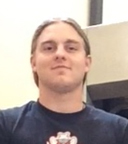 Junior Dalton Montana May performed research this summer at Brazil Arapongas Senia
on the thermal aging of eucalyptus wood with a goal of understanding whether the use
of an autoclave is viable in industry as an alternative to chemical aging. He found
that the thermal/pressure autoclave treatment did result in a desirable color change,
similar to chemical aging. However, the physical and mechanical properties of the
autoclave-treated wood were worse, with an increase in water adsorption and poorer
modulus. Dalton obtained his position, which was at an industrial school for high
school and older vocational students, through the WCOE's international program.
Junior Dalton Montana May performed research this summer at Brazil Arapongas Senia
on the thermal aging of eucalyptus wood with a goal of understanding whether the use
of an autoclave is viable in industry as an alternative to chemical aging. He found
that the thermal/pressure autoclave treatment did result in a desirable color change,
similar to chemical aging. However, the physical and mechanical properties of the
autoclave-treated wood were worse, with an increase in water adsorption and poorer
modulus. Dalton obtained his position, which was at an industrial school for high
school and older vocational students, through the WCOE's international program.
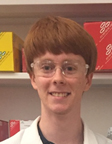 Junior Matthew Parker interned at Texas Biomedical Research Institute for the second
consecutive summer. Matthew worked with Dr. Melanie Carless, whose laboratory focuses
on identifying epigenetic differences in the genome that could be the causes of neurological
disorders. Matthew examined the genetic differences between baboon blood and brain
cells by analyzing the micro-RNA found in each type of cell, as well as from other
tissues in the brain. In a second project, he investigated regulation of a gene that
has been found to have high levels of expression in Alzheimer patients. After graduating
from Texas Tech, Matthew plans to pursue his PhD in biomedical engineering and then
conduct research in industry.
Junior Matthew Parker interned at Texas Biomedical Research Institute for the second
consecutive summer. Matthew worked with Dr. Melanie Carless, whose laboratory focuses
on identifying epigenetic differences in the genome that could be the causes of neurological
disorders. Matthew examined the genetic differences between baboon blood and brain
cells by analyzing the micro-RNA found in each type of cell, as well as from other
tissues in the brain. In a second project, he investigated regulation of a gene that
has been found to have high levels of expression in Alzheimer patients. After graduating
from Texas Tech, Matthew plans to pursue his PhD in biomedical engineering and then
conduct research in industry.
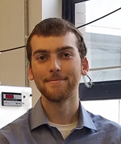 Junior Ethan Thomas spent the summer performing research in Dublin, Ireland at Dublin
City University. Ethan worked on a concise literature review of proton exchange membranes
and alkaline electrolysis used for hydrogen production, as well as building and testing
an alkaline electrolyser. The ultimate goal of the project is to identify materials
that will significantly reduce costs when scaling up electrolysers for industrial
use and, at the same time, effectively lowering electrode current densities for more
pure hydrogen production.
Junior Ethan Thomas spent the summer performing research in Dublin, Ireland at Dublin
City University. Ethan worked on a concise literature review of proton exchange membranes
and alkaline electrolysis used for hydrogen production, as well as building and testing
an alkaline electrolyser. The ultimate goal of the project is to identify materials
that will significantly reduce costs when scaling up electrolysers for industrial
use and, at the same time, effectively lowering electrode current densities for more
pure hydrogen production.
 Senior Yiwei Wang performed research this summer with Dr. Ted Wiesner and Horn Professor
Jay Conover on a chemometrics project, developing a computer program which focuses
only on the most important data used to control an electric power plant using sunlight
as an energy source. Yiwei uses the technique "Latin Hypercube Sampling" to prune
the redundant and noninformative readings from plant sensors. Her research will contribute
to making solar thermal electric power economically competitive with fossil-fuel electric
power. Yiwei plans to obtain an advanced degree in ChE after graduation.
Senior Yiwei Wang performed research this summer with Dr. Ted Wiesner and Horn Professor
Jay Conover on a chemometrics project, developing a computer program which focuses
only on the most important data used to control an electric power plant using sunlight
as an energy source. Yiwei uses the technique "Latin Hypercube Sampling" to prune
the redundant and noninformative readings from plant sensors. Her research will contribute
to making solar thermal electric power economically competitive with fossil-fuel electric
power. Yiwei plans to obtain an advanced degree in ChE after graduation.
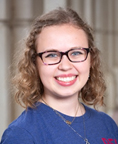 Junior Lauren Ward performed research this summer in the laboratory of Dr. Julie A.
Stenken at the University of Arkansas. Lauren's work focused on optimization of membrane
diffusivity for microdialysis. Lauren fabricated in-house membranes and then characterized
those membranes by measuring the diffusivity of three probe molecules, each having
different size and affinity characteristics, using equilibrium dialysis. She compared
the results to commercial membranes and presented the work in the program's poster
session. The research is part of a larger effort in the laboratory to understand how
implanted biomaterials impact their microenvironment. Microdialysis is used in the
research because it allows continuous measurement of many biological molecules, such
as glucose or hormones, in a relatively non-invasive way.
Junior Lauren Ward performed research this summer in the laboratory of Dr. Julie A.
Stenken at the University of Arkansas. Lauren's work focused on optimization of membrane
diffusivity for microdialysis. Lauren fabricated in-house membranes and then characterized
those membranes by measuring the diffusivity of three probe molecules, each having
different size and affinity characteristics, using equilibrium dialysis. She compared
the results to commercial membranes and presented the work in the program's poster
session. The research is part of a larger effort in the laboratory to understand how
implanted biomaterials impact their microenvironment. Microdialysis is used in the
research because it allows continuous measurement of many biological molecules, such
as glucose or hormones, in a relatively non-invasive way.
Edward E. Whitacre Jr. College of Engineering
-
Address
100 Engineering Center Box 43103 Lubbock, Texas 79409-3103 -
Phone
806.742.3451 -
Email
webmaster.coe@ttu.edu


